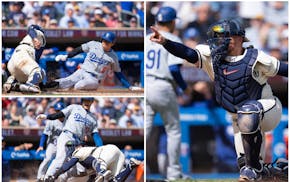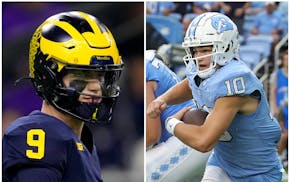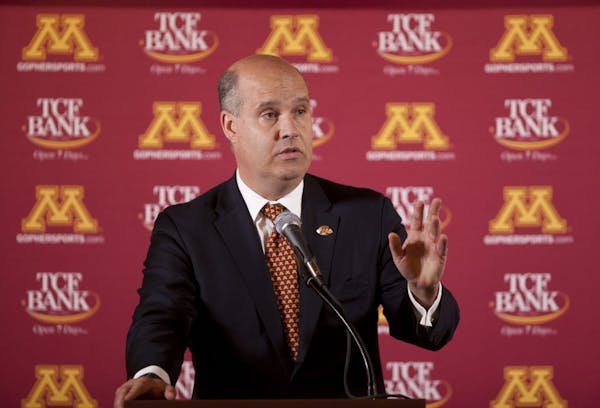Jerry Kill looked tired last week. He looked emotionally spent. Not just because of the flap over receiver A.J. Barker's angry departure from the Gophers football team and 4,000-word rant.
Kill also quietly has been dealing with difficult personal issues, including spending several nights at a local hospital with an ill member of his extended family. This has been a tough time for the Gophers coach and that continued Saturday when his latest epileptic seizure left him unable to coach the second half of a loss to Michigan State in the regular-season finale.
Kill's absence created another distraction for a football program that has bathed in turmoil the past six weeks. The Gophers have a significant problem in regards to Kill's health, whether they want to believe that or not.
This has become a sensitive subject that unfortunately can't just be brushed aside as something routine or part of everyday life. School officials press that message anytime Kill suffers a seizure that becomes public knowledge. It's not a big deal, they say. Many people suffer from epilepsy and function normally otherwise in their lives and occupations, they note. They also remind us that Kill's loyal assistants know the drill, so they're equipped to assume control with little disruption in his absence.
That might be true, but this is a big deal in terms of the program's image, outside perception and overall confidence of a frustrated fan base. It is a big deal when a coach suffers a seizure on the sideline or in the locker room at halftime. It is a big deal when the ticker at the bottom of the TV screen draws attention to it on an endless loop for a national audience. We can't possibly know the degree to which it affects recruiting, but it's reasonable to think it doesn't help.
But what is the answer? That's the hard part. There is no easy solution or manual for how to handle this situation because it's so unusual in his profession.
Let's be clear about something, though: Kill should not be blamed in any way for this. It's not his fault and I'm sure it crushed his spirits that he missed his team's postseason banquet on Sunday. Kill is a good man who is working tirelessly to turn his program into a winner. I admire Kill personally, respect him professionally and hope he's successful in rebuilding his program.
But it's hard to ignore the potential consequences that his seizure disorder might have on his program. The Gophers already face enough hurdles and obstacles in trying to pull themselves out of this abyss. They need their head coach on the sidelines, not unavailable for the second half of a critical Big Ten game.
I contacted a half-dozen former players Monday to get their thoughts and perspective on the situation. Their answers ran the gamut. One said he doesn't see it as having a major impact, one expressed concern about the long-term implications, one supported Kill but questioned the school's public relations approach in addressing the matter, one worried about negative recruiting. They all seemed conflicted and not completely sure how to gauge the overall impact.
It's naive to think other coaches won't use Kill's seizures in recruiting. That sounds heartless and crass, but some recruiters would undercut their own mother if that helped in their pursuit of talent. No high school player or parent would ever publicly cite that as a reason for not choosing Minnesota for obvious reasons, but defensive coordinator Tracy Claeys admitted earlier this season that a few recruits have informed Kill that other recruiters have mentioned his condition.
Freshman receiver Jamel Harbison was on his official recruiting visit last fall when Kill suffered his sideline seizure against New Mexico State. Harbison said he had studied Kill's past and was aware of his medical history so he wasn't startled when he collapsed. Nor did it discourage him from signing with the Gophers.
"After I got back home from my visit, Coach Kill gave me a call," Harbison said. "He basically said it's just a little health issue and I'm going to fight back, don't worry about it."
That's not easy for everyone to do. Kill understandably detests talking about his health for that reason alone, but public attention and fan angst are inevitable with each episode. Kill has shown no inclination to step aside in order to focus on his health, nor should the school force his hand. Does anyone honestly believe the best idea is for the program to start over again?
Hopefully, Kill and his doctors can find the right plan to manage his epilepsy. He lost weight over the summer, changed his diet and exercised more. They need to exhaust every avenue to get a handle on this as best they can.
Jerry Kill wants to coach football, not be viewed as a distraction.
Chip Scoggins ascoggins@startribune.com
Scoggins: 'Wait one more year' can't be the Wild's plan. Thankfully, it isn't.

Scoggins: Finch feeling heat of the Suns as playoff battle looms
Scoggins: Why 'championship or bust' fits these Wolves

Scoggins: Anatomy of a game-saving play as Correa throws out Ohtani


